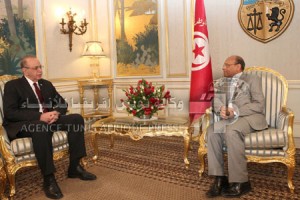Tunis, 18 May:
Talks between senior government ministers took place in Tunisia earlier today, on issues including border security, criminal extraditions and . . .[restrict]the retrieval of illegal funds held abroad.
Amongst the Libyan delegation were Prime Minister Abderrahim El-Kib, Employment Minister Mustapha Al-Rahbani, Deputy Justice Minister Khalifa Fradj, and Army Chief of Staff Youssef Mangouch.

Meeting with Tunisia’s President Moncef Marzouki, Prime Minister El-Kib discussed relations between Libya and Tunisia, focusing in particular on the common bonds forged by both countries’ pro-democracy uprisings in 2011. El-Kib remarked that Libyans and Tunisians had showed “exemplary” solidarity with one another in the wake of their respective revolutions, adding that these talks “confirm the solid historical ties binding the Tunisian and Libyan peoples”.
Discussion of specific areas on concern took place between El-Kib’s ministers and their Tunisian counterparts.
The extradition of criminals and retrieval of illegal funds abroad was the focus of a meeting between Deputy Justice Minister Fradj and Tunisia’s Justice Minister Noureddine B’hiri. The two men discussed the potential of developing a cooperation programme between judicial institutions and the exchange of expertise in the management of such bodies. The possibility of Libyan judges being sent to Tunisia for training was also discussed.
Speaking with Tunisian Defence Minister Abdelkarim Zbidi, General Mangouch discussed military cooperation between Libya and Tunisia in the areas of training and the exchange of expertise. General Mangouch underlined the importance of collaboration on border security, as well as Libya’s readiness to draw on the expertise of the Tunisian armed forces in areas including training, securing borders and sustainable development.
Finally, Employment Minister Mustapha Al-Rahbani said that Libya’s private sector needs 3,000 Tunisian workers. The minister added that some 5,000 Libyans would also be sent to Tunisia for training. The meeting was also used as an occasion to reactivate a memorandum of understanding concluded between the two countries last March in the fields of vocational training and employment. The agreement provides for encouraging the employment of Tunisians in Libya and vice versa, as well twinning programmes between Libyan and Tunisian enterprises.
[/restrict]







